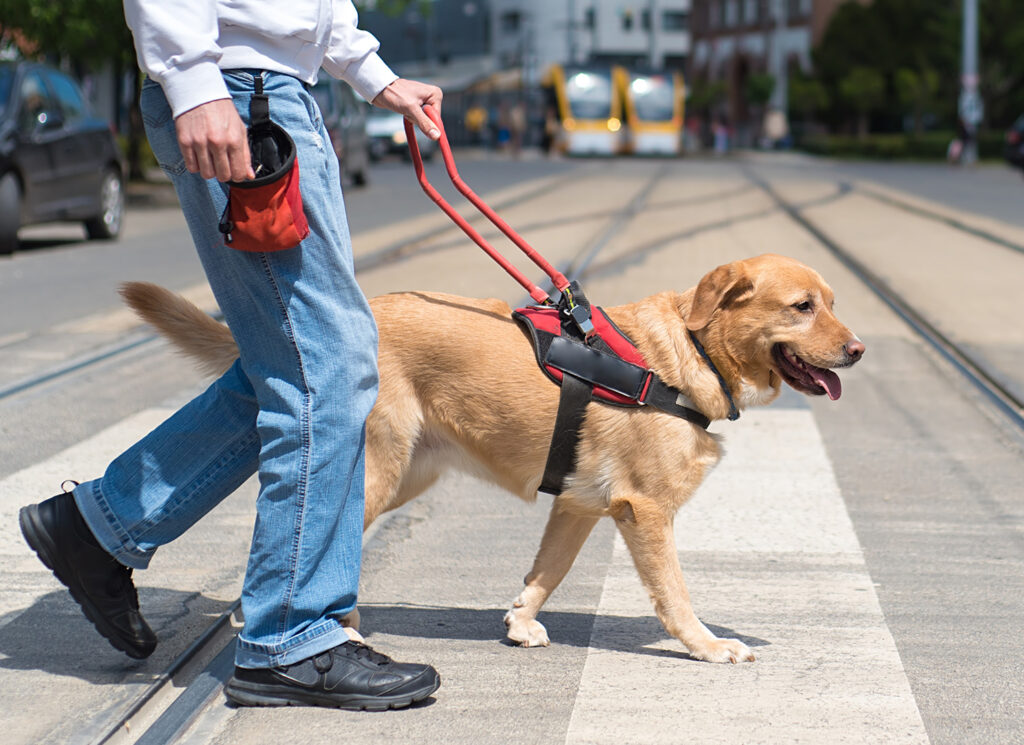Therapy dogs are not service dogs. Service dogs are dogs who are specially trained to perform specific tasks to help a person who has a disability. Service dogs stay with their person and have special access privileges in public places such as on planes, restaurants, etc. Therapy dogs, such as ones who work toward earning therapy titles and completion certificates, do not have the same special access as service dogs.
Therapy Dog Molly
Molly was adopted from the Humane Society when her mom was just looking for a pup to snuggle. Now she’s an 8-year-old black lab – black lab with hair the length and texture of a golden retriever – and while she was the best girl ever to her mom, she also grew up to be a superstar.
Although Molly was a little shy at first, she opened right up when she was introduced to some special needs kids. Caroline Trautman-Miller, Molly’s owner, decided to pursue that connection and started therapy dog training. Molly achieved the highest level in the AKC Therapy Dog program with over 500 visits.
Therapy dogs are dogs who go with their owners to volunteer in settings such as schools, hospitals, and nursing homes. From working with a child who is learning to read to visiting a senior in assisted living, therapy dogs and their owners work together as a team to improve the lives of other people.
Caroline brought Molly to several classrooms with children who were shy or non-verbal or unable to focus, and the kids would respond to her calming energy. Caroline recants a story: “One time this little boy who was a complete introvert sat next to Molly and read an entire book. I teared up seeing the progress he made in just one visit.”
After sessions everyone was allowed to talk to Molly. The kids – ranging in age from Pre-K to 5th grade – received a visit around once a month and usually read with Molly. Caroline estimate Molly has touched more than a thousand kids over the past seven years.
If your dog meets the criteria and you would like to apply for an AKC Therapy Dog title, you can contact the AKC at www.AKC.org
Therapy Dog Titles achieved through visits:
- AKC Therapy Dog Novice (THDN)
Must have completed 10 visits. - AKC Therapy Dog (THD)
Must have completed 50 visits. - AKC Therapy Dog Advanced (THDA)
Must have completed 100 visits. - AKC Therapy Dog Excellent (THDX)
Must have completed 200 visits. - AKC Therapy Dog Distinguished (THDD)
Must have completed 400 visits.
“Now people know her name better than mine,” Caroline says. “I’m just the woman that brings her.”
Service Dog Briggs
Caroline first became interested in training working dogs when she volunteered to raise a puppy as a service dog for the blind. Her friend was in the program, and once she learned more about it decided it would be a good fit for her. She was matched with a Doberman named Briggs (short for Brigadier General) and dedicated herself to training for Gallant Hearts Guide Dog Center and helping “To give a person who is blind one of the most cherished gifts they will ever receive” she said, quoting the tagline for the organization.
Gallant Hearts Guide Dog Center places well trained, healthy dogs throughout the United States, and, occasionally, in Canada. The dogs are provided to people whose primary disability is blindness (and who have no more than 20/800 visual acuity in the best eye with best correction or no more than 20 degrees field of vision). The dogs are provided, free of charge, to qualified individuals who have been approved by the Center’s Admissions Committee.
As a volunteer, Caroline kept her puppy for 16 months (the average range being 12 to 18 months) with Gallant Hearts paying all expenses–food, veterinary care, heartworm preventative, flea and tick control, and an obedience course for puppy and puppy raiser.
The puppy goes along whenever you travel or run errands, and gains exposure to everything you would encounter moving through the world. In most places, you can take your puppy with you as long as it is house broken, well behaved and has on its “Guide Dog in Training” vest. Many stores allow non-service well behaved dogs in already, such as Home Depot. In other cases, you might need to get permission from store managers to bring your puppy into non-dog places of business for training.
What you’ll need to do for a puppy: housebreak it, socialize it by taking it to as many places as possible, teach it good house manners, and obedience train it. Gallant Hearts staff will help you resolve any training or behavioral problems you might have with the puppy. In a nutshell, you provide guidance for a puppy until it is old enough and mature enough to guide a person who is blind.
Gallant hearts puppies in Missouri pairs dogs to people who qualify to be puppy raisers. For those interested in learning more, you can find more information here:
Gallant Hearts Guide Dog Center
131 Red Fox Lane
Madison, MS 39110
(601) 853-6996 or email: rfloyd@gallanthearts.org
Caroline has participated in both therapy and service dog training, and currently lives with Molly, her companion and celebrated therapy dog. Briggs graduated his training and moved on to become a working service dog.
As for training dogs to go out and help in the world, Caroline has this to say: “It’s the most rewarding thing you can do”.



